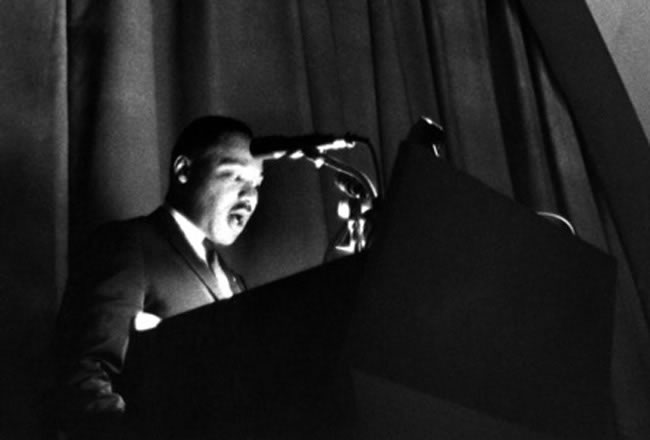
FOUND: Lost Recording of Martin Luther King, Jr.’s Speech at The New School
Standing before a rapt audience at the Auditorium at 66 West 12th Street on February 6, 1964, the Rev. Dr. Martin Luther King, Jr. railed against injustices plaguing American society: economic hardship in black communities, inequality in the country’s public school system, and resistance to civil rights legislation among the political elite. However, King, forever the uplifting orator, ended his New School speech on a hopeful note.
Calling on the world to reject the status quo thinking holding back the Civil Rights Movement, King said, “With such maladjustment, we will be able to emerge from the bleak and desolate midnight of man’s inhumanity to man, into the bright and glittering daybreak of freedom and justice”
“With this kind of work and with this faith, 1964 can be a great year of achievement,” he continued. “With this faith, we will be able to adjourn the councils of despair and bring new light into the dark chambers of pessimism. With this faith, we will be able to transform the jangling discords of our nation into a beautiful symphony of brotherhood.”
King was prescient in his optimism: months later, Congress would pass the Civil Rights Act, groundbreaking legislation for which the civil rights leader dedicated his life.
The speech was an important moment in King’s campaign for civil rights — and a momentous occasion for The New School. So, when a lost tape of King’s post-lecture Q&A was found at the New York City university a half-century later, students and faculty members erupted in celebration. Still, a crucial piece of the puzzle remained missing: the recording of the speech itself.
Now, at long last, it has been recovered. Recently the missing tape of King’s hour-long lecture at The New School was discovered in a box of reel-to-reel tapes at WAMH, Amherst College’s student radio station, and made available to the public on the university’s website. The rescue of the recording concludes a protracted search for a cherished artifact that reaffirms The New School’s rich history of hosting real-time conversations on the most pressing issues facing our world.
“In 2011, before the New School Archives was formed, a student found a recording in Fogelman Library that turned out to be the Q&A following King’s opening lecture of the American Race Crisis lecture series,” says New School archivist Wendy Scheir. “The Q&A is exciting to listen to because we get to hear King speak off-the-cuff — you get a feel for his mood at that key moment in the civil rights struggle, and his sense of humor really comes through. Now that our Amherst colleagues have recovered the speech itself, we’re so pleased to be able to present the speech and Q&A together for the first time.”
When King came to The New School as part of the hastily convened American Race Crisis lecture series, several hundred people from the university community attended. But they weren’t the only ones who heard it. Thanks to WAMH, which aired King’s speech in its entirety, hundreds of other people across Greater Boston listened in, too. In so doing, the radio station preserved a crucial piece of New School history: as was its protocol, WAMH recorded the broadcast on a reel-to-reel audio tape and stored in its archives.
And there it remained — until Amherst College archivist Mariah Leavitt came along. Last year, in an effort to pull together all of the school’s material on WAMH, Leavitt began sifting through the box of old recordings from the 1950s, 60s, and 70s. It wasn’t long before the tape made its presence known.
“I found three boxes of reel-to-reel audio tapes of shows that had been broadcast from the 1950s through the 1970s and given to us in 1989,” Leavitt recalls. “Most interesting was one reel reading ‘Martin Luther King, Pres. of the Southern Christian Leadership Conference.’”
Intrigued by the discovery, Leavitt performed a quick Google search to determine whether any other recording of King’s speech at The New School existed. Zero results. However, she did learn of a recording of the Q&A held after the speech. Found in 2011 by then-New School student Chris Crews, the recording was featured in an exhibition at the Sheila C. Johnson Design Center, Voices of Crisis, produced by the New School Archives and curated by former New School student Miles Kohrman.
Scheir confirmed that the tape is the only known recording of King’s speech at The New School. Now both the speech and the Q&A session can be heard together on the New School Archives’ digital collections site.
“We’re proud to be able to share this important moment in New School history,” Scheir says. “It’s astonishing how so many of the issues King raises are still issues in 2016. So the recording is not only a lifeless artifact from the past, it becomes part of conversations we’re still having as a society. Many of King’s analyses and calls to action are still relevant.”
Indeed, for many people in The New School community, the recovery of the recording is a reminder that King’s work remains unfinished — and that action to address the issues he raised is still needed.
“In short, if this problem is to be solved, there must be a sort of divine discontent and a determination on the part of people of good will to work passionately and unrelentingly to see that the dignity and worth of the human personality will be respected,” King said. “I have often mentioned the fact that if this problem is to be solved, somebody will have to get upset enough to work with determination to see that it is solved.”